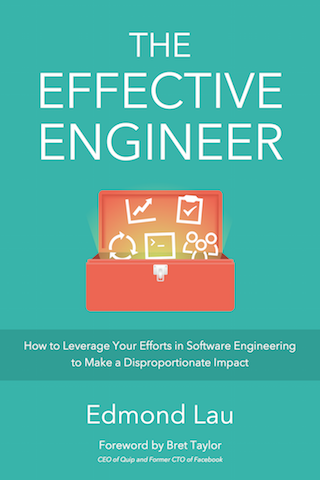Master Adjacent Disciplines

“Should I focus on becoming a generalist or a specialist? Which route better sets myself up for career success?” Engineers who already know the importance of learning and of investing in themselves often ask these questions and wonder where to best spend their time.
You can find effective engineers who create successful careers by becoming deeply proficient experts in their field — whether they’re experts in machine learning, systems infrastructure, or product design. You can also find examples of full-stack engineers who amplify the output of any team with their abilities to execute on a wide diversity of tasks. So either route can potentially lead to success.
If motivation comes freely to you in some area, capitalize on it to master that area. Learn and do what you love. Anyone who’s procrastinated knows that motivation can at times be hard to come by, so channel that passion into time and energy spent on learning. That excitement will allow you to sustainably spend more time learning than if you forced yourself to learn something that completely bores you.
But if there isn’t any particular area you’re passionate about, a more powerful framework than just haphazardly learning unrelated skills is to focus your effort on adjacent disciplines. Adjacent disciplines are those disciplines immediately to the left or right of your own that you interact with on a daily basis to get things done. Steven Sinofsky, the former head of Microsoft’s Windows division, introduced the term when discussing career progression toward becoming a general manager, 1 but it’s a term that’s equally relevant for engineers or for people in any other field.
If you’re a product engineer, adjacent disciplines might include user interface design, user research, server development, or automated testing. For an infrastructure engineer, they might include database internals, basic web development, or machine learning. User growth engineers could benefit by increasing their skills in data science, marketing, behavioral psychology, and writing. For technical or project leads, adjacent disciplines might include both product management and people management. And if you’re a product manager or designer, you might learn to code.
Personal Benefits of Focusing on Adjacent Disciplines
Why focus on adjacent disciplines? There are numerous benefits to building a foundation in these areas.
The most direct benefit is that these skills make you more self-sufficient and effective in your day-to-day job. How often have you been blocked on a project because you were bottlenecked on resources, perhaps from a designer or from another team? Or wished that you had better workflows and lacked the know-how to build or improve them on your own? Or been unsure of what priorities to focus on next because you didn’t know enough about your users and your customers?
Familiarity with adjacent disciplines that you commonly depend on gives you the flexibility to potentially tackle those areas on your own. You might not necessarily be the most proficient at these adjacent areas, but if your choices are limited to either spending three days of your own time to get a product working sooner versus waiting two weeks for someone more proficient on your team to get around to it, you might decide to do it on your own. That option only exists if you have that adjacent skill set.
In comparison to learning a completely unrelated but perhaps still valuable discipline, you’re almost guaranteed to use these new skills you acquire in your day-to-day work. And, as decades of research on learning has shown, the active retrieval of the new knowledge means that what you learn is much more likely to stick. Random learning can be hard to retain otherwise.
When you’re considering future career opportunities, that adjacency experience will almost certainly distinguish you from other candidates as well. If you’re an engineer who can design product features, a designer who can also code, or a product manager who can also write enough SQL to analyze data sets, then you have significantly more opportunities available to you than someone in the same roles who lack the complementary skill sets.
How Knowledge of Adjacent Disciplines Also Benefits Your Team
Aside from helping your own career, learning adjacent disciplines also greatly benefits your team. For one, it increases your empathy for teammates in different roles. It’s not uncommon in the industry for a systems or infrastructure engineer to consider his work as more hardcore or critical than a front-end or product engineer’s. Or for a machine learning expert to believe her time and talent to be more indispensable than someone on the engineering team. Or for engineers to view product managers along with their schedules, meetings, and status checks a nuisance. And yet, for any discipline, there is a depth to the art and science involved, and those who excel at it can make meaningful contributions to the team.
If you plan to ever become a team lead or manager, knowing what’s easy or hard about other people’s roles is incredibly important, as it helps you identify which risky areas you need to watch more closely to execute well on a project. And even if you have no such ambitions, the empathy for other disciplines makes it more likely that you’ll treat these teammates as partners rather than adversaries, and you’ll be more easily be able to provide useful feedback to them.
Another team-related benefit comes when you’re trying to recruit and hire a diversity of talent. Jocelyn Goldfein, a former Facebook engineering director, shared a story of how Facebook used to face a shortage of engineers with strong product instincts. 2 The team was strong in coding fluency and systems design, and when they interviewed potential engineering candidates, they tended to ask questions based on what they knew. Unfortunately, that also meant that the people who passed their hiring bar shared similar traits.
When engineers have a broader skill set in adjacent disciplines, they can more effectively evaluate candidates with strengths outside of their own core discipline. It’s for the same reason that technical founders who need to hire a salesperson often choose to handle sales on their own initially 3 — the experience gives them more perspective on how to evaluate potential sales candidates. These experiences, in turn, mean that those involved in interviews and hiring can build more effective teams with a diversity of skills. Some leaders, like Marc Hedlund, the former VP of Engineering at Stripe and Etsy have even argued that “diversity of skills is the strongest predictor of a team’s success,” 4 making the investments in adjacent disciplines even more valuable.
So what disciplines are adjacent to your own? Find the time to study, learn, or even master them.
Steven Sinofsky, “The path to GM – some thoughts on becoming a general manager”, Steven Sinofsky’s Microsoft TechTalk. ↩
Jocelyn Goldfein, “How To Hire Engineers: Step 0, What To Look For”, Medium. ↩
“Should a startup founder handle sales when first getting started?”, Quora. ↩
Marc Hedlund, comment on “How To Hire Engineers: Step 0, What To Look For”, Medium. ↩

“A comprehensive tour of our industry's collective wisdom written with clarity.”
— Jack Heart, Engineering Manager at Asana
“Edmond managed to distill his decade of engineering experience into crystal-clear best practices.”
— Daniel Peng, Senior Staff Engineer at Google

“A comprehensive tour of our industry's collective wisdom written with clarity.”
— Jack Heart, Engineering Manager at Asana
“Edmond managed to distill his decade of engineering experience into crystal-clear best practices.”
— Daniel Peng, Senior Staff Engineer at Google


















Leave a Comment